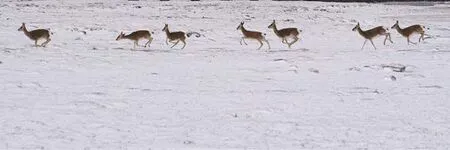The Hunt Is Not On
2011-10-14ByYUANYUAN
By YUAN YUAN
The Hunt Is Not On
By YUAN YUAN

WILD WORLD: Blue sheep run around the Dulan International Hunting Ground
China’s ban on trophy hunting remains despite calls for a relaxation
Dulan, a small town in northwest China’s Qinghai Province, would have been an unfamiliar name to most Chinese, if not for the recent high-profile debate regarding the possible relaxation of a six-year ban on hunting in the vicinity of the town.
Foreign hunters have been familiar with Dulan since 1992 when they were fi rst granted permits to hunt in the area. The State Forestry Administration (SFA) banned hunting in the region in 2006 amidst concerns that hunters were killing too many animals and damaging the local ecosystem.
However, on August 5, a 20-member expert panel reviewed and approved the request of seven U.S. hunters, who sought permission to hunt nine blue sheep and seven Tibetan gazelles at the Dulan International Hunting Ground.
Fierce debate
The hunters handed in applications through two Beijing-based travel agencies,China Adventure Travel and China Women Travel Service, to the SFA.
In response, the SFA established an expert panel to assess the unusual request. After a four-hour meeting on August 5, the panel proposed the SFA issue licenses to the hunters.
“The number of requested tags is far below the international standard, and the impacts of the planned hunting on the local wildlife are negligible,” said operators of the Dulan International Hunting Ground.
Wang Wei, General Manager of China Adventure Travel, echoed these sentiments.“What our travel service has arranged with these foreigners follows the stipulations in the Law on the Protection of Wildlife and the Administrative Licensing Law. Applying for licenses to hunt blue sheep and Tibetan gazelle does not violate domestic laws and is in accordance with international practices,” he said.
However, the reaction to the proposal to grant new hunting permits has been overwhelmingly negative. In an online survey released by Sina, a leading Web portal in China, out of 1,000 respondents, 97 percent strongly opposed lifting the ban on trophy hunting. Animal conservationists are unanimous in their condemnation of the expert panel’s decision.
Hua Ning, China Program Director of the International Fund for Animal Welfare, urged the government to think twice before lifting the ban. “Hunting is cruel and most profits go into the pockets of operators of hunting grounds instead of local communities and people,” Hua said.
Seventy animal conservation organizations presented an open letter to the SFA on August 13, expressing their “great indignation” when they learned international trophy hunting might again be allowed.
They also asked the government to publicize the status of operations at all hunting grounds in China, the number and types of species being hunted every day, the profits being made, and how the money received by hunting grounds is allocated and spent.
Daerwen, a Beijing-based environmental protection group, is one of the 70 organizations that submitted the open letter. Its founder, Feng Yongfeng, said he had no choice but to question the government and the experts’ moves to consider resuming international trophy hunting, while the degradation of wildlife in China showed no signs of being reversed.
“They really need to understand more about trophy hunting and sustainable modes of conservation before attacking the sport so fiercely,” said Wang, who has a college degree in animal protection. “A hunting ban won’t secure the future of wild animals in Qinghai. The locals have to find a way to make a living. If they cannot make money from visiting hunters, they will turn to hunting themselves or begin to encroach on local reserves.”
Jia Jingbo, Dean of the College of Wildlife Resources of Northeast Forestry University in Harbin, Heilongjiang Province,believes limited hunting will contribute to wildlife conservation as the revenues generated from licensed hunting can be used for animal protection work and to boost the local economy and bene fi t residents’ livelihoods.
“The precondition is the government should carefully count the number of game animals and set strict quotas on licensed hunting,” Jia said.
Public opinion, however, continues to be strongly opposed to issuing new hunting permits. “So you are saying that you can protect the animals by killing them?” said a netizen called Dazuiyu. “If we reopen the hunting ground in Dulan to foreigners, it is hard to say how many more will come. The number of animals they want is small this time, what about next time and the time after next? It will increase fast.”
On September 2, the two travel agencies announced that they had withdrawn their applications, they claimed this was because hunting season had already passed. “We submitted the applications at the end of 2010 and the hunters were supposed to be there on September 16,” Wang said. “Even if we got permission now, we’d have to pass through various additional procedures. It will be too late.”
“The public knows little about hunting grounds in China, including who owns them and there are no clear ways to access them,”Jia said. “All of the mystery has increased the public’s mistrust of trophy hunting programs.”
A world-class facility
Dulan was not a regulated hunting ground before the 1990s.
In 1985, a Chinese-American, Liu Guolie, discovered the abundant wildlife in Dulan and proposed the establishment of a hunting ground in the vicinity of the town.The SFA agreed to give Liu a fi ve-year trial.
Covering 13,000 hectares, the Dulan International Hunting Ground is home to about 160,000 wild animals, including snow leopards, white-lipped deer, blue sheep and argali, which are highly protected but can be hunted in China.
In 1992, two years after the trial, Dulan became the fi rst international hunting ground in China and it started to operate as a business reporting pro fi ts and losses.
According to statistics from the Dulan International Hunting Ground, by the end of 2005, hunting had brought in more than $36 million from 1,101 foreign hunters, who captured 1,300 “trophies.”
“Hunting was simply a tradition of the locals,” said Luo Busheng, a senior staff of the hunting ground. “In the 1960s and 70s,almost every household had a gun, and would kill 20-30 animals every year. Though the Law on the Protection of Wildlife effective in 1988 banned hunting animals that are under state protection, poaching still happened from time to time.”
According to him, patrolling to prevent illegal hunting by poachers and local residents was one of the most important jobs of the local government.
Since the Dulan International Hunting Ground was set up, things changed a lot. “It helped protect the interests of local herders and local wildlife,” Luo said.
Until 2006, the Dulan International Hunting Ground raised 4 million yuan($627,000) as tax revenues from hunting.According to Luo, about 10 percent of all hunting revenues were directly used for the conservation of wildlife in Dulan, and much of the remainder was spent on wildlife surveys and compensation for farmers whose grasslands were used for hunting.
“It is a much easier way to make money than herding sheep,” said 57-year-old local resident Gong’a. “When hunters came the whole village got excited, since the hunters usually rented grassland from local residents for about 5,000-6,000 yuan ($784-940) in winter and 2,000-3,000 yuan ($314-470) in summer. Each household could cash in 5,000 yuan every year from hunting,” he said.
Gong’a also revealed monitoring systems adopted from game reserves in Western countries were used to supervise hunters.Each hunter was accompanied by 6 to 8 people including guides and supervisors from the local forestry authorities.
“The hunting business actually made herders aware of the value of wild animals,and encouraged them to abandon their old tradition of ad-hoc hunting,” said Wang Wei, Deputy Director of the Department of Wildlife Conservation of the SFA.“Moreover, they would also reserve a section of their grasslands for blue sheep and protect them from poachers.”
Shutdown
The open season of Dulan’s animals didn’t last long. In the later half of 2006, the Dulan International Hunting Ground had to cease operations due to enforcement of the Law on the Protection of Wildlife, which maintains it is illegal to hunt animals that are under state protection. Since then the SFA has suspended granting hunting licenses to any foreigners. Following its closure, most of the hunting ground employees lost their jobs.Now, there are only fi ve people managing the hunting ground, including a manager and a deputy manager.
“There are too many animals now,” said Gong’a, adding the area of grassland available for sheep to graze on is diminishing.
Although local residents have fenced off their pastures, wild animals find ways through the fences, “It’s very likely half of my grassland will be eaten up,” Gong’a said.
According to 2009 data from local authorities, the number of blue sheep living in Dulan had increased from 30,000 to 40,000 over the past 20 years, while the number of Tibetan gazelles rose from 480 to 1,500.
“The quota for hunting annually from 1992 to 2006 was much lower than the internationally accepted 5 percent of the total population of the species subject to hunting,” Luo said.“Every year, there are a regular amount of wild animals that die naturally anyway. For example, blue sheep lose about 40 to 50 head annually, while Tibetan gazelles lose about 20 to 30 head annually. After the ban, these wasted natural resources do not bene fi t anyone.”
Hunting in Dulan is not totally banned.Hunting for special purposes, such as scientific research, domestication, breeding, and exhibitions, is still permitted there. “But till 2011, there had been no applications on this,”Luo said.

CFP
